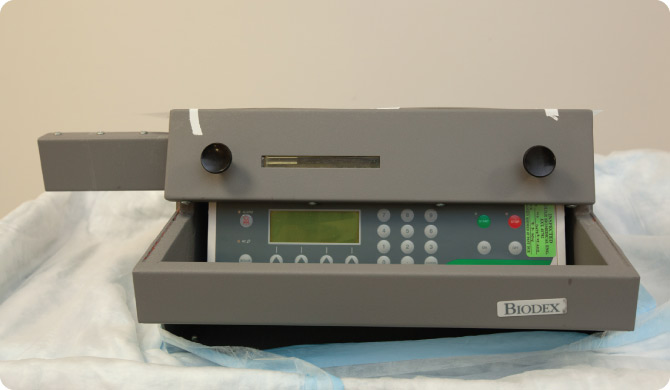What is MIBG?
I-131 MIBG is a drug that is used to treat neuroblastoma. It is a clear liquid, made of two materials: metaiodobenzylguanidine, or MIBG, and I-131, a radioactive material. The MIBG carries the radioactive I-131 specifically to the patients’ tumors, where it targets the cancer cells over many weeks.
MIBG treatment process
Before infusion
- Before they receive MIBG, the patient will be given oral potassium iodide (also referred to as “SSKI”). This protects the thyroid from I-131. Your child will continue to take this for six weeks after MIBG treatment.
- A bladder catheter (Foley catheter) will be placed to drain urine and reduce radiation exposure to the bladder. An oral medicine will be prescribed to prevent bladder spasms while the catheter is in place. Patients may also receive an IV medication to keep them calm while they have the catheter in place.
- The patient will receive an IV anti-nausea medication, such as ondansetron (Zofran), throughout their hospital stay.
During infusion

MIBG is given slowly using an infusion pump like the one shown above. The pump sends the MIBG into the bloodstream using the patient’s central line. The process takes about two hours and is not painful. The patient’s blood pressure and heart rate will be checked every 15 minutes during the infusion.
Inside the patient’s body
Once the radioactive material enters the bloodstream, it travels to the cancer cells in the patient’s body. A significant amount of the radioactive material travels into the kidneys and is passed out of the body through the patient’s urine over several days. The patient will have a bladder catheter (Foley catheter) throughout most of their hospital stay. While most of the radiation passes out of the body through the urine, some of the radioactive material will leave the patient’s body through sweat, saliva, and feces.
Outside the patient’s body
The radiation leaving the patient’s body in the days following treatment is what makes MIBG so different from other cancer treatments. Because MIBG is radioactive, it is handled very carefully. We take many precautions to ensure your safety, and the safety of other patients and staff, while treating a patient with MIBG. To limit radiation exposure to others, you will be the primary caregiver for the patient, who will stay in a special room at the hospital until the radiation has gone down to a safe level. This usually takes 2 to 5 days from the time the MIBG is given.